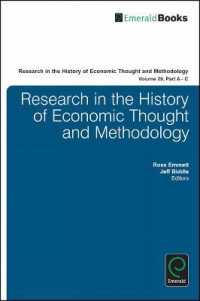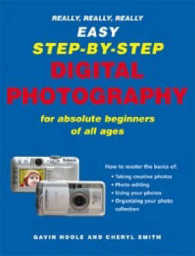- ホーム
- > 洋書
- > 英文書
- > Religion / Ethics
基本説明
Brings together key texts from Solovyov's writings about Sophia: Poetry, fiction, drama, and philosophy, all extensively annotated and some available in English for the first time.
Full Description
Solovyov's wisdom writings captivated several generations of poets and philosophers during the pre- and postrevolutionary periods in Russia and abroad. In particular, his Sophiology had a profound influence on such major figures of Russia's Silver Age as Alexander Blok, Andrei Belyi, Pavel Florensky, and Sergei Bulgakov.
The founder of modern Russian philosophy, Vladimir Solovyov (1853-1900) is widely considered its greatest practitioner. Together with Dostoevsky and Tolstoy, he is one of the towering intellectual figures in late-nineteenth-century Russia, and his diverse writings influenced much of the non-Marxist tradition of twentieth-century Russian thought. Philosopher, journalist, poet, and playwright, Solovyov was also a mystic who claimed to have had three visions of Divine Sophia. This personification of wisdom with golden hair and a radiant aura echoes both the eternal feminine and the world soul. Rooted in Christian and Jewish mysticism, Eastern Orthodox iconography, Greek philosophy, and European romanticism, the Sophiology that suffuses Solovyov's philosophical and artistic works is both intellectually sophisticated and profoundly inspiring.
Judith Deutsch Kornblatt brings together key texts from Solovyov's writings about Sophia: poetry, fiction, drama, and philosophy, all extensively annotated and some available in English for the first time (with assistance from the translators Boris Jakim and Laury Magnus). In the comprehensive introductory essay that encompasses the book's first half, Kornblatt establishes the historical, philosophical, religious, and literary context of Solovyov's Sophiology, emphasizing its connection to contemporaneous religious and philosophical thought as well as other social and cultural trends in Europe and the United States-for example, Solovyov's reactions to his changing world ran parallel to and sometimes intersected with those of Darwin, Nietzsche, and William James.
Sophiology is once again finding enthusiasts both in Russia and among seekers around the world. The definitive introduction to Solovyov's wisdom and its profound impact on Russian thought and culture, Divine Sophia makes Solovyov's mystical visions and literary "re-visions" of Sophia accessible to scholars and lay readers alike.
Contents
Part I: Who Is Solovyov and What Is Sophia?Introduction: Visions and Re- Visions of Sophia
The "Life Drama" of Solovyov
Positivism and Spiritualism / Feminism and Pansophism
Wisdom's Bequest: Sophia through the Ages
Solovyov as Self- Conscious Heir
How to Write a Vision?
Conclusion: Sophia as Divinely Human Mediator
Part II: The Wisdom Writings of Solovyov—Annotated Translations
1. Early Sophianic Poems
Reading Guide
Early Poems
"My tsaritsa appeared to me"
"My empress has a lofty palace"
"Near, far off, not here, not there"
2. The Sophia: A "Mystical- Theosophical- Philosophical-Theurgical- Political" Dialogue
Reading Guide
The Sophia
"On Man's Metaphysical Need"
"Sophie. First Triad. First Principles"
"First Dialogue: The Absolute Principle as Unity (The Principle of Monism)"
"Second Dialogue: The Absolute Principle as Duality (The Principle of Dualism)"
["Third Dialogue"]
"Second Dialogue: The Cosmic and Historical Process"
"Third Chapter: Morality and Politics"
3. Sophia in Philosophical Prose
Reading Guide
"Fragments": An Overview
"On the Three Worlds"
"On the Three Conditions (in General)"
From "Theological Principles"
From Lectures on Divine Humanity: An Overview
Lecture Seven
Lecture Eight
Lecture Nine
Lecture Ten
Lectures Eleven and Twelve
From Russia and the Universal Church (Book Three): An Overview
"III. The Divine Essence and Its Threefold Manifestation"
"IV. The World Soul as the Foundation of Creation, Space, Time, and Mechanical Causality"
"V. The Higher World. The Freedom of the Pure Spirits"
"VI. The Three Chief Stages of the Cosmogonic Process"
"VII. The Threefold Incarnation of Divine Wisdom"
"The Idea of Humanity in Auguste Comte": An Overview
"The Idea of Humanity in Auguste Comte"
4. "At the Dawn of Misty Youth": A Semiautobiographical Short Story
Reading Guide
"At the Dawn of Misty Youth"
5. The White Lily: Or a Dream on the Eve of the Feast of the Protection of the Mother of God (A Mystery- Jest in Three Acts)
Reading Guide
The White Lily
6. Three Encounters: Final Poema
Reading Guide
Three Encounters
Source Notes to the Translations
Bibliography
Index








